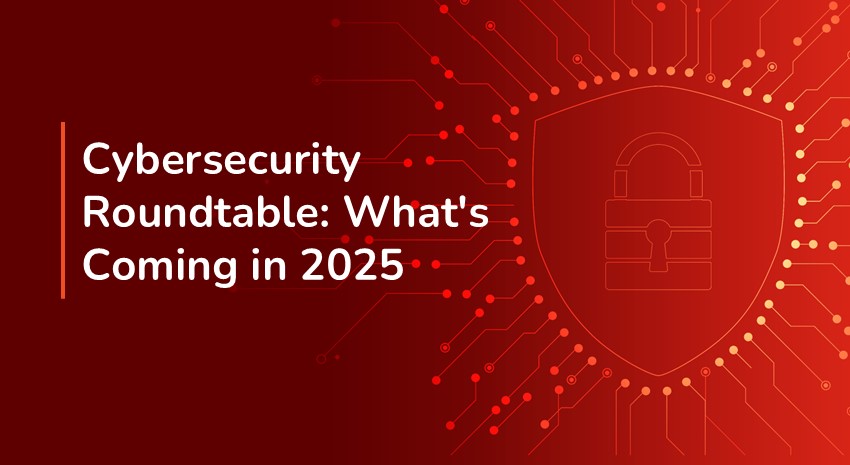Cybersecurity Roundtable: What's Coming in 2025

With the surge of cyberattacks and increasing government regulations, it’s clear that cybersecurity will be a top concern for businesses of all types and sizes in 2025. Driven by regulatory pressures and supply chain requirements, next year will likely see SMBs (Small – Medium-sized businesses) investing in cybersecurity measures more proactively.
We asked a panel of our cybersecurity experts here at ArcherPoint about the trends they saw for 2025. Here are the highlights of that discussion:
SMBs are a prime target
Cyber attackers have adapted to the heightened security measures of larger enterprises by turning their focus to SMBs, where security infrastructure is often less developed. Smaller companies often lack the budget for advanced security measures, making them an easier target for attackers who still use outdated yet effective methods. Many of these attacks exploit simple vulnerabilities—default credentials like “admin/admin” or even exposed accounts with no passwords at all. For SMBs, where technical expertise may be limited, implementing even basic security protocols is often overlooked. This lack of even a minimal level of security awareness and upkeep can make breaches seem almost inevitable for SMBs. The impact of a cybersecurity breach can cost these companies time, money, and reputational damage that could otherwise be avoided through simple precautions.
2025: The year of SMB cybersecurity adoption
Given the vulnerabilities SMBs face, 2025 may be the year these businesses begin serious investment in cybersecurity. With supply chain security becoming a crucial aspect, larger companies will likely demand more stringent security protocols from SMBs. This shift will be driven not just by compliance but by the need for basic security baselines that protect SMBs from preventable breaches.
Zero trust, an approach that requires verification of every access request, will become a foundational element in SMB cybersecurity. Zero trust effectively removes implicit trust within a network, ensuring that users, devices, and applications are authenticated at every point. SMBs, especially those working closely with larger enterprises, will be increasingly required to implement zero-trust architectures to ensure their cybersecurity measures align with industry standards.
AI: the double-edged sword
AI is poised to reshape cybersecurity, both for attackers and defenders. While AI can strengthen security with predictive and automated threat detection, it also empowers cybercriminals to launch more sophisticated attacks. AI can generate highly targeted phishing emails for a minimal cost, making it easier for attackers to bypass traditional defenses. With advancements in AI, the volume and complexity of attacks will likely increase, challenging SMBs that lack in-house cybersecurity teams.
On the positive side, AI-driven cybersecurity solutions allow for faster and more efficient threat detection and response, especially important for small companies facing a high volume of alerts daily. Automation can help streamline response processes, freeing cybersecurity teams to focus on more complex threats. However, implementing these AI tools requires a solid understanding of their limitations: AI models are only as effective as the data they’re trained on, and relying on AI without verification can lead to disastrous outcomes.
New regulations on the horizon
Cybersecurity regulations are expected to tighten in 2025, particularly for businesses involved in government contracting. The Cybersecurity Maturity Model Certification (CMMC) 2.0, a new government mandate, will significantly impact contractors, holding them to stricter standards for data protection. This trend is expected to spread to other industries, pushing SMBs to align their security measures with regulatory standards. These new regulations will drive SMBs to invest in cybersecurity, whether or not they have faced direct threats themselves.
In addition to zero-trust architectures, cyber insurance will become increasingly relevant. Insurers will likely ask for evidence of a company’s security measures, increasing demand for risk assessments and vulnerability scans. With a history of cyber incidents becoming a potential factor in cybersecurity insurance policies, SMBs that take proactive measures now will be better positioned to mitigate future costs and risks.
Choosing the right cybersecurity partner
With various cybersecurity providers offering overlapping services, SMBs often face the challenge of selecting the right partner. At a minimum, SMBs need to choose a provider aligned with their specific security needs, even if they’re not the “perfect” fit. Just as with any IT solution, security vendors can vary significantly in features, reporting, and support, so conducting thorough research and leveraging trial periods can help businesses identify a good match.
The overarching takeaway? Small businesses need to treat cybersecurity as an investment. Whether through selecting an AI-based solution, implementing zero trust, or partnering with reputable vendors, staying one step ahead of cyber threats will be crucial for SMBs navigating an increasingly complex digital world in 2025.
ArcherPoint’s Managed IT Services offers a wide range of services to help you design, monitor, and secure your Microsoft Dynamics 365 Business Central environment. Contact us to learn more.
Trending Posts
Stay Informed
Choose Your Preferences
"*required" indicates required fields
